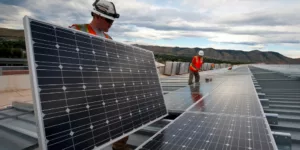Your electricity bill is exorbitant and you want to cut the cost. Now, there is a solution — solar panels.
You could save up to $84 per month on your electricity bill using solar panels. And you’ll be doing the planet a favor as solar panels are a green source of energy.
Before making any decisions you should consider these 5 factors to make the best choice for a solar panel for your home.
1. Location of your roof
The purpose of buying a solar panel will be defeated if you install your solar panels in a location where it has no access to sunlight.
Check if you have trees blocking sunlight from your roof or neighboring tall buildings that cast a shadow blocking your roof’s access to sunlight. Then installing a solar panel on that roof will most probably not give the desired output to justify the investment.
To make your solar panel system more efficient, it must have maximum hours of access to sunlight. Most companies will calculate the efficiency of a panel for you as a customer service.
2. Your home energy usage
You need to consider the electricity usage of your home to determine the number of solar panels that will be needed to cover your electricity needs.
You need to perform an energy review and see what devices you use in the house, their consumption and of course how many people live in your house.
Your energy consumption and hours of effective sunshine will determine the size and number of the necessary solar panels to meet your energy needs.
3. Strength and size of your roof
Let’s say your roof is in the right place but is it strong enough for installation of solar panels?
If you have a weak roof, then you should consider changing your roof before installing solar panels on it. Also, if you have plans to renovate your roof, you should do that before installation of the solar panels.
Apart from being strong, you also have to know if your roof is big enough for the number of panels that will be installed on it.
4. How capable is your installer?
Trying to install your solar panel system yourself to save money could actually end up costing more. It’s better to get an experienced installer to help you out.
Your installer must be accredited by the North American Board of Certified Energy Practitioners (NABCEP) and they must draw up a contract for installation and explain its content to you.
They’ll also advise you on the most efficient solar panels for your house and help with getting a building permit before you make your installation.
5. Cost of purchase and installation
Leasing could be an alternative for short term use but if you plan to use your solar panels for a long time, it is cheaper to buy your own system.
You can collect quotes from local companies just to compare prices and choose the best price for you.
Installing solar panels could cost you up to $17,000 and the solar panel itself could work for 20-30 years — but you have to consider the cost of other parts like the photovoltaic cells and the inverter that may need changing every few years.
Conclusion
In conclusion, the cost of solar panels is now 60% lower than it was in 2011 — but it’s still a huge amount of money and you have to consider these factors to make the best choice for your home.








